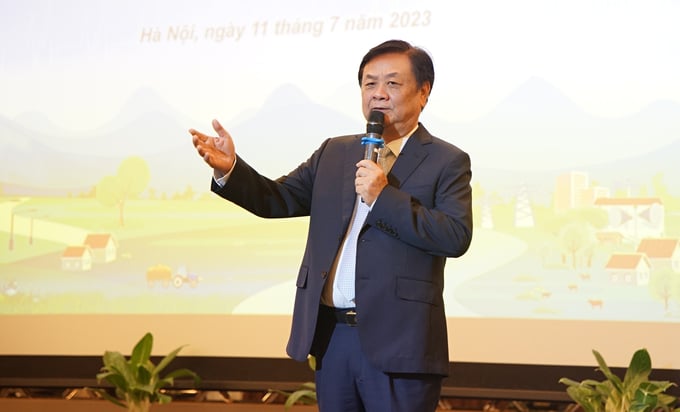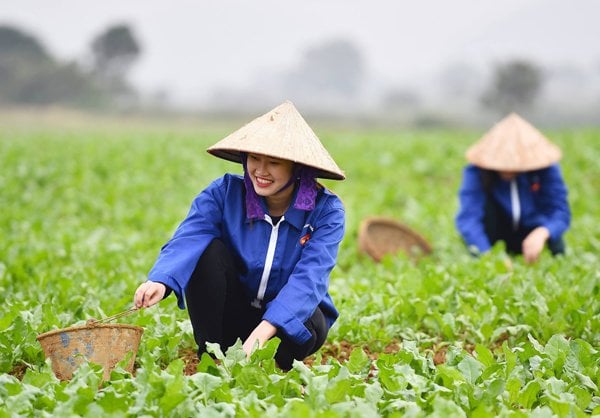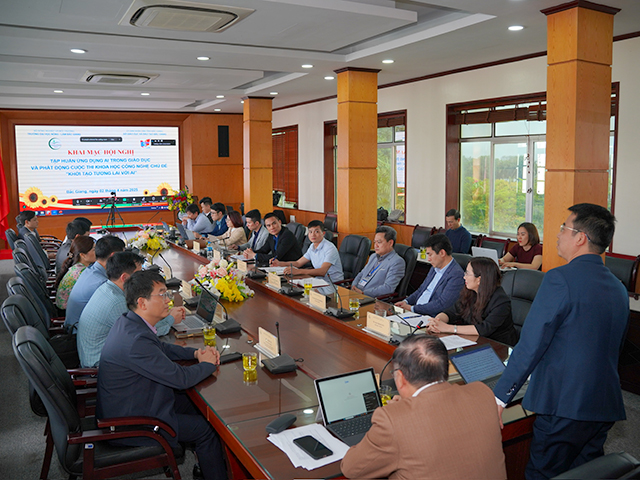(VAN) – Minister Le Minh Hoan stated that agricultural teaching in technical curriculum should be expanded in order to attract more students.

Minister Le Minh Hoan spoke at the “Conference on cooperation in training and human resource development in agriculture and rural areas” on July 11. Photo: Linh Linh.
Changing training concepts
At the “Conference on cooperation in training and developing human resources in agriculture and rural areas” held on July 11 by the Ministry of Agriculture and Rural Development, Minister Le Minh Hoan emphasized the need to promote cooperation and link the conditions of labor recruitment and scientific research between enterprises and training institutions, focusing on the development of high-quality agricultural human resources.
The precipitous decline in the number of students majoring in agriculture, fisheries, forestry, and irrigation poses challenges for the agriculture and rural sectors’ human resource development.
According to Minister Le Minh Hoan, communication has not been promoted; therefore, it is necessary to communicate effectively so that students can gain a greater understanding of agriculture in general and its disciplines in particular.
“Escapism from agriculture is a common trend in the industrialization – modernization process, and it is necessary to reevaluate how training in the field of agriculture inspires and introduces students to agriculture,” said the minister.
Minister Le Minh Hoan explained that, as a result of the progress of industrialization and modernization, the agricultural sector is now more open, with a strong application of science and technology in farming, forestry development, etc.
“Oftentimes we limit ourselves to the agricultural sector in closed curricula, but now, open agriculture has a great deal of related training and employment, including e-commerce, electronics, agricultural tourism, and mechanical engineering”. The Minister suggested that training facilities should make room for students to learn that agriculture also employs cutting-edge science and technology.
According to Minister Le Minh Hoan, agricultural economic thought is affiliated with the market and commerce. It is necessary to infuse training institutions with the “new wind” of the market and market economy. This is how to train high-quality human resources while simultaneously integrating theory and practice into the training process.
Universities will also link research activities with enterprise economic activities. The two sides will create a “symbiotic” bond so as not to waste investment resources from businesses and the government.
Education and training will be promoted in a market-oriented manner so that agricultural products can appear on the market, and students can learn about business life and integrate with the market. Not all agricultural lectures should be of a technical nature.

Companies and businesses in this field need to take the initiative to go ahead to search for and train human resources based on cooperation models with institutes and schools.
Adopting the “golden triangle” model to prevent loss of resources
Ms. Nguyen Thi Lan, the director of the Vietnam Academy of Agriculture, stated that the agricultural industry is in desperate need of high-quality human resources, enticing pupils with a passion for agriculture and training. Training them to contribute to the industry is the responsibility not only of training institutions and the industry, but also of ministries, sectors, and businesses.
This is the first time that the Ministry of Agriculture and Rural Development has organized a large-scale conference on human resources that includes institutes, schools, enterprises, and management agencies in order to share a common voice, understand challenges and solutions, and pave a new path for the future.
The combination of the “golden triangle” model between the government, universities, and businesses has created sustainable development and fostered the growth of the industry, according to the lessons learned from other nations.
Ms. Nguyen Thi Lan stated that it is necessary to strengthen mechanisms, policies, and institutions to generate encouragement and support for businesses in order to encourage businesses and training institutions to find each other and combine in a sustainable manner. If they participate in the training procedure, their career prospects will improve.
Mr. Vu Van Huong, Deputy General Director of Vietnam Forestry Corporation (Vinafor), opined that human resources in the fields of agriculture and forestry are extremely difficult; consequently, businesses and corporations in these fields face many challenges. This must proceed proactively to identify and train human resources based on cooperation models with academic institutions.
In addition, according to Mr. Huong, it is necessary to include industry-specific content in the training work in order to train the personnel in various areas. He believes that training human resources is essential for businesses to be competitive, thereby facilitating a breakthrough in the agricultural industry.
Source: https://vietnamagriculture.nongnghiep.vn/








